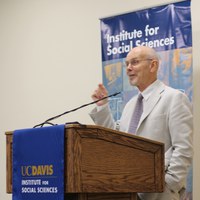Should corporate bodies enjoy the same legal rights as individuals? That was the question addressed by Philip Pettit in the 2015 Sheffrin Lecture in Public Policy.
Currently Laurance S. Rockefeller Professor of Politics and Human Values at Princeton University, Pettit was introduced by Interim Dean of Social Sciences Li Zhang and by David Copp, distinguished professor of philosophy. Pettit's lecture on Oct, 29, 2015, "Giving Corporate Bodies Their Due—and Only Their Due," shed light on the potential repercussions of granting corporations too much freedom.
He began with some historical background, joking that history is “more fun than philosophy, though not as deeply intriguing.” Published in 1651, Hobbes’s Leviathan introduced the notion of the corporation to define companies of merchants (such as the East India Company) who, as Pettit put it, “ganged together just for purposes of convenience.”
But it was Sir William Blackstone, in his 18th-century treatise Laws of England, who first attributed legal rights to corporate bodies. Blackstone declared a corporate body able to act and speak by its “common seal”, echoing Hobbes’s belief that such a body can be said to exist when it speaks in a “constructed voice”—a voice through which various partners are represented.

Sledgehammer ruling
By the 19th century, corporations were thriving in the U.S. as networks of canals and railways were rolled out across the country. It was in this context, in 1886, that the case of Santa Clara County vs. Southern Pacific Railroad delivered a legal “sledgehammer,” as Pettit described it, the repercussions of which can be felt to this day.
Applying, by way of an obiter dictum (a remark made in passing), a constitutional amendment (the 14th) originally designed to protect the rights of emancipated slaves, the U.S. Supreme Court implied that corporations were protected in the same way as persons, making the U.S. the only jurisdiction in the world to privilege corporate bodies in this way.
The Santa Clara judgment not only reads the legal rights of corporations into the constitution—it also suggests that it is morally right that they have protection equal to that of individuals. This, Pettit said, raises a complex moral question that demands philosophical discussion.
Corporations as agents
As systems pursuing certain purposes in a reliable fashion, corporations should, Pettit asserted, be regarded as agents. (Preferring to view them as “dense markets,” economists may resist this definition—wrongly, in Pettit’s view.) Like individuals, corporations are special, conversable agents that avow their beliefs, rather than simply reporting them. In other words, they “put their money where their mouth is.” In doing so, they earn the privilege of “agential rights” that enable them to propose and advertise their actions. To that particular end, Pettit argued, corporate bodies should indeed enjoy legal rights in the same role as individuals.
However, he went on, they ought not to enjoy rights on the same basis. (Here Pettit lightheartedly warned audience-members to brace themselves for a dose of philosophy’s trademark “relentless aridity.”) Protecting the rights of the individual requires careful attention to matters of welfare and fairness. Just as allowing individuals to associate without restriction can lead to the formation of criminal organizations (cartels, gangs, and so on), giving corporate bodies free rein to associate may have detrimental social effects. As such, they should be granted legal rights only so far as those rights benefit the individual in society.
Fairness above all
Finally, Pettit argued that corporations ought not to enjoy legal rights in the same rangeas individuals. Most importantly, corporate rights must not compromise internal, social or political fairness. Is it right, for example, that corporations can exert extraordinary power over political figures? Or declare legal fees as business costs for tax purposes, while individuals cannot? Pettit claimed not.
Summing up, he asserted that the normative humanist philosophy he had just described—which argues for limiting the rights of corporate bodies—remains consistent with the strain of humanism that argues equally for corporate responsibility. Exploring such matters presents an opportunity to identify optimal rights within corporations and beyond, and to ensure that corporate bodies are held responsible for their actions, no matter how creative the excuses offered by the individuals of which they are comprised.
— Ben Hinshaw
The Sheffrin Lectures in Public Policy are possible thanks to a gift from economics professor emeritus Steven M. Sheffrin, and his wife, Anjali. The lectures cover topics related to the social sciences and public policy that have broad relevance to UC Davis students and faculty, as well as to the wider university community and beyond.
